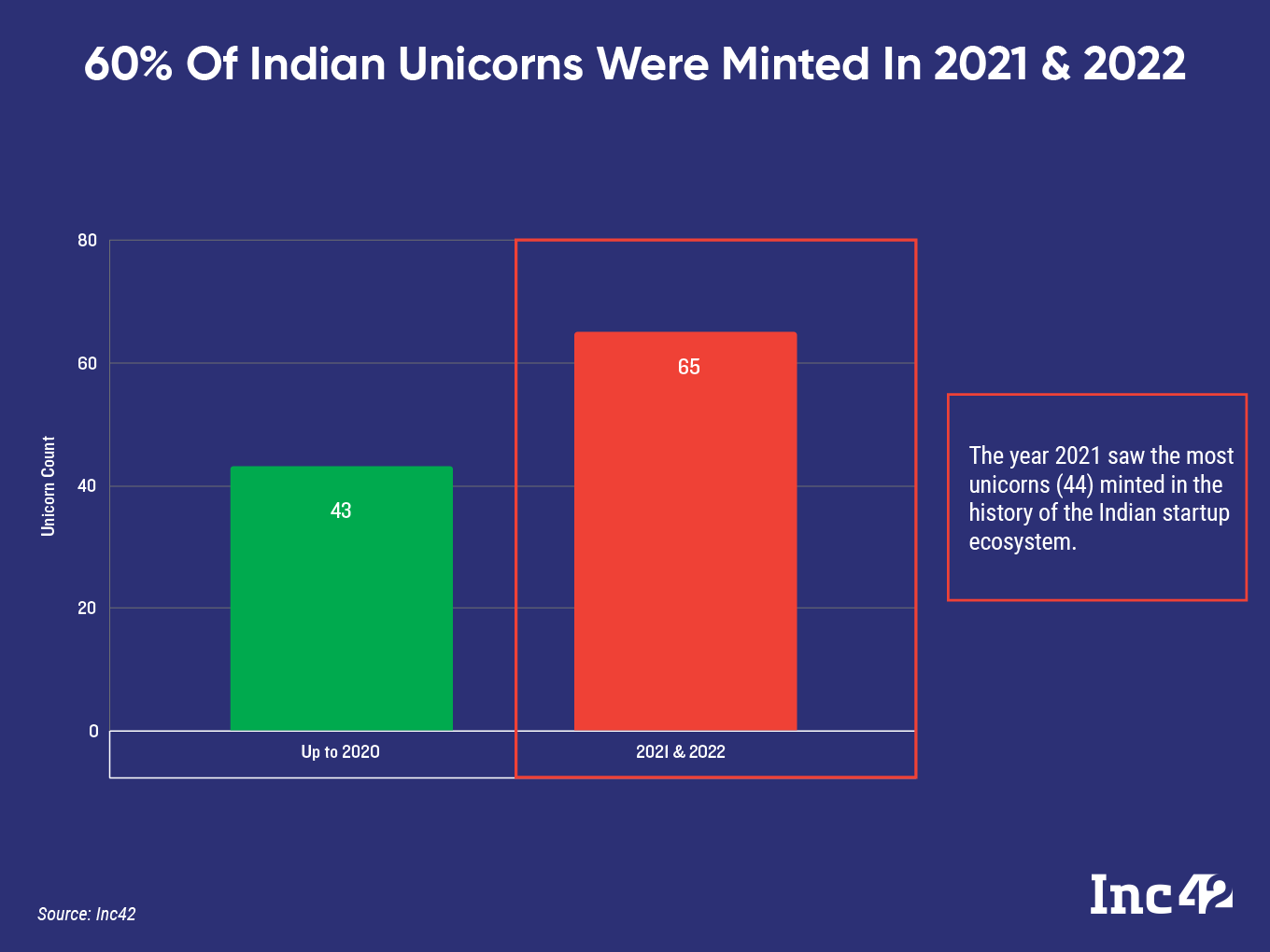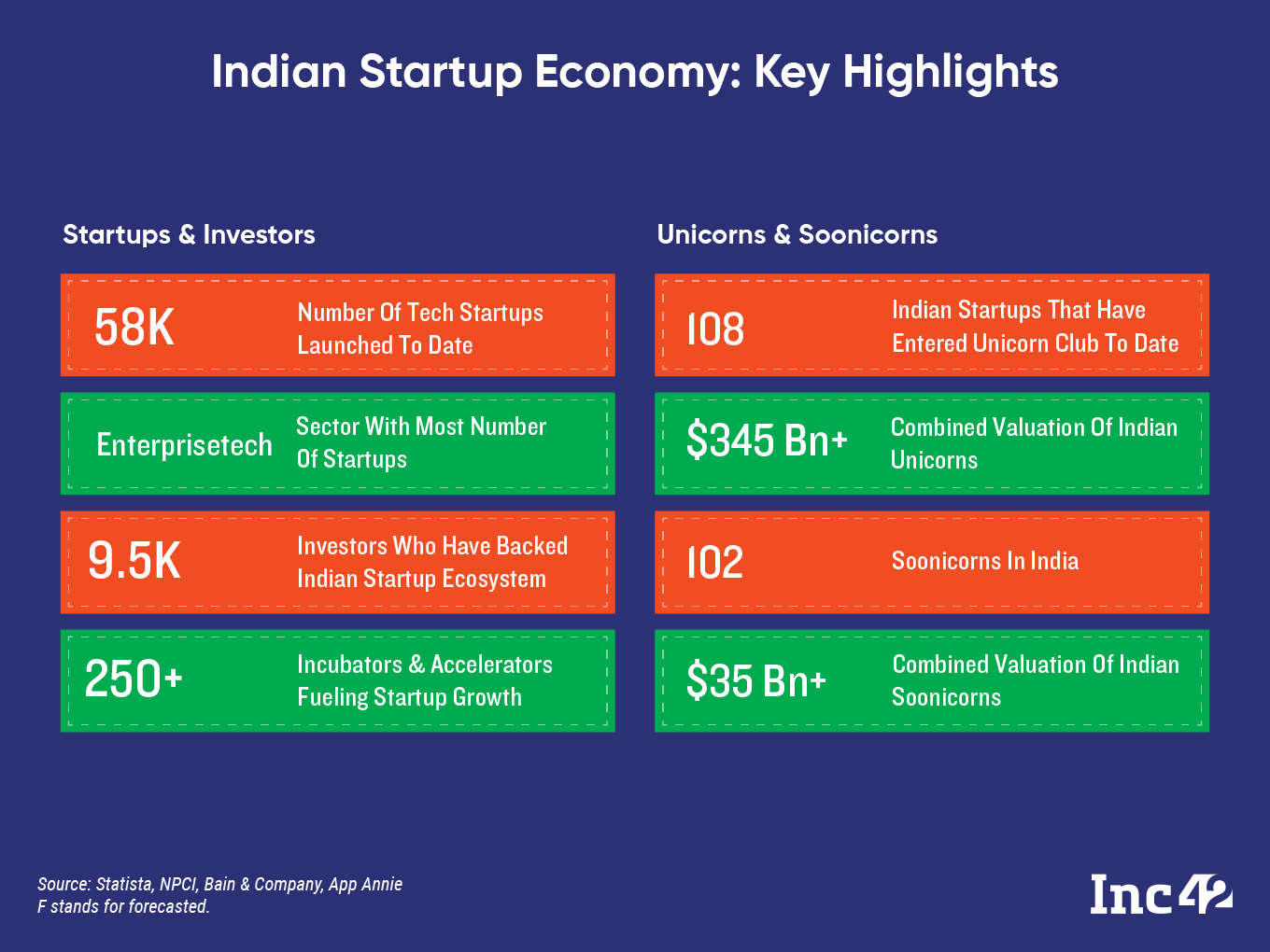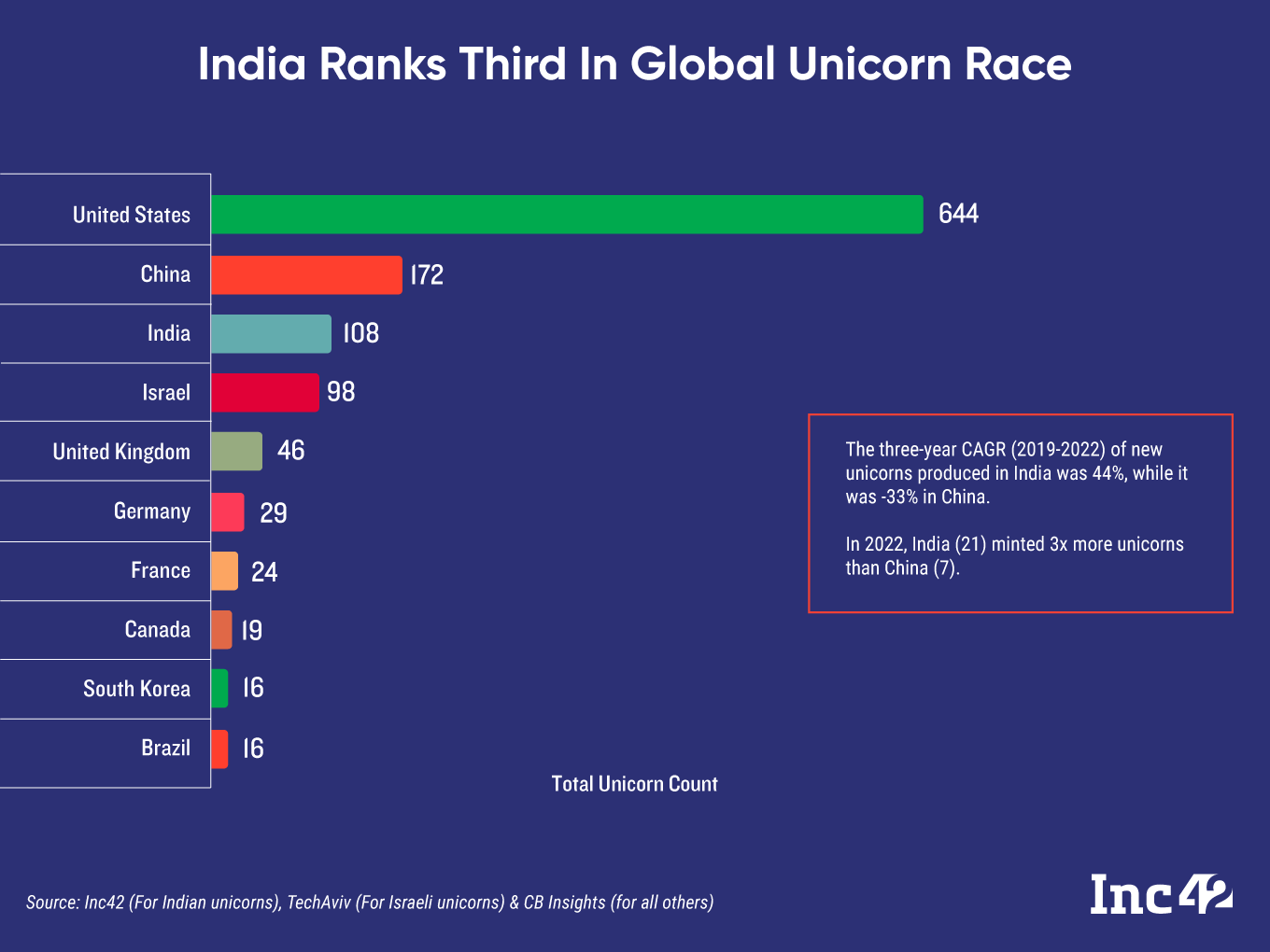This National Startup Day, let’s not forget the larger picture — tough times shall pass but the influence of startups is not about to wane any time soon.
Seven years ago on January 16, 2016, the Indian startup ecosystem finally got what it wanted from the Indian government — a big policy push in the name of Startup India to take India’s tech economy to the next stage. Today, after the rollercoaster of 2022, there’s hope of a new beginning with the day now marked as National Startup Day.
The past seven years have fundamentally been about the journey of the Indian startup ecosystem and like a startup — 2016 was the beginning, followed by unabated growth, the speed bumps of 2022 and now hope of maturity and sustainability in 2023.
Having seen this journey up close since 2014 (even before Startup India), and being at the centre of it as a watchdog and a voice of support — January 16 and the National Startup Day is as much of a landmark day for Inc42 as it is for Indian startups.
When we began, startups were a novelty term and not part of the mainstream. Nearly nine years later, in 2023, startups are topics of living room conversations at millions of homes and has changed the social and economic fabric of India in several ways.
Like we said last year, the National Startup Day is a good starting point to celebrate this growth. The year that followed, however, did not go well for many startups with more than layoffs, shutdowns and severe downturn. So this January 16 is also a time for reflection and regathering besides a celebration of the next phase of startups.
2016 to 2023: The Rise Of A Startup Nation
Startups have been around in India since the 1990s — Info Edge and IndiaMART, two of India’s earliest internet ventures, continue to play a major role in the ecosystem today. But it’s only in the late 2010s that many of today’s best-known startups stepped into the limelight.

The launch of Startup India in January 2016 gave these new-age businesses a massive push, and since then startups have helped India widen its footprint in the global tech landscape.
Since 2016 (or indeed 2014 when Inc42 was launched), we have witnessed India’s influence grow gradually and have also seen startups reach corners of the country that have not traditionally been known for innovation.

Even till 2018, India only had 24 unicorns, with a whopping 84 unicorns coming since 2019. The combined valuation of the Indian startup ecosystem’s 108 unicorns alone is over $345 Bn. Just goes to show how rapidly the ecosystem has matured.
Despite a global macroeconomic slowdown in 2022, Indian startups outpaced the China ecosystem in terms of unicorns. While China only saw seven startups enter the unicorn club, India had 3X the number. While India is currently the third largest startup ecosystem in the world, there’s no doubt that it’s on pace to reach the second spot in the next couple of years.
While funding records and unicorns are not analogues for growth, they do show that India is an attractive investment destination for foreign investors and even domestic investors can make the most of the opportunity.
That’s because India is easily the largest internet market for most companies.The consumer digital opportunity is expected to be around $800 Bn by 2030.
To support this growth, startups built jobs and attracted the best talent in recent years. Startups registered with the Startup India initiative have helped create over 8.5 Lakh direct and indirect jobs since its inception in 2016.

As entrepreneurs look to generate wealth for key employees, startups and newly-public companies have bought back ESOPs worth over $335 Mn in 2021 and well over $196.5 Mn in 2022. This is fuelling the next-generation of startups as well as validating the wealth promise of the startup ecosystem.
Yet, so far the Indian startup story has just been about tapping into the creamy layer of India. As they eye hinterland markets, a golden opportunity awaits them, something not many startups have been able to tap.
The need of the hour is backing startups in emerging hubs, and we saw signs of this happening in 2022. Funding isn’t limited to Bengaluru, Delhi or Mumbai anymore as emerging hubs and local ecosystems are growing.
Policy Push: The Catalyst For Startups
While the macro view is great for the Indian tech economy, when we look at the sector-wise growth, developments and microtrends the cracks are also apparent.
There’s no doubt that over the past eight years, the Indian government has eased rules around registering businesses and indeed taxation for startups. India’s ranking in the global innovation index improved from 81 to 46 between 2014 and 2021 and the rank in the Doing Business Report has increased from 142 in 2015 to 63 in 2021, when the rankings were last updated.
The government cannot escape criticism on many fronts when it comes to lack of policies or clarity in regulations, but at the same time one cannot deny that the government’s push has enabled Indian startups to make the most of the opportunity, largely through Startup India.
It’s also what makes the Indian startup ecosystem somewhat unique in the global context. We can’t think of any economy which celebrates a National Startup Day, for instance, or where the Prime Minister and key cabinet ministers bring up the contribution of startups and their role in modernising India.
The Startup-20 Engagement Group, which is a key part of India’s G20 presidency, is an example of the Indian government pushing the envelope when it comes to startups. Besides opening up opportunities for startups in G20 nations, this initiative will look to export India’s digital public infrastructure such as UPI, account aggregators and India Stack.

Among these, UPI remains the best and most notable recent example of government-startup collaboration, perhaps anywhere in the world. It has formed the backbone of fintech growth and grown to displace credit cards for digital transactions in just six years, which is no mean feat.
The total UPI transaction value stood at over INR 125 Lakh Cr in 2022, with more than 7,400 Cr transactions, or nearly 2,348 UPI transactions per second.
The government’s push for startups has also been seen in public comments and parliamentary debates. From Piyush Goyal to Nirmala Sitharaman to Rajeev Chandrasekhar, key ministers in the government today are reading the startup pulse.
Undoubtedly, PM Modi has been the most high-profile political leader to back Indian startups, but the fact that the business models of edtech startups and the state of gig economy tech companies have become a matter of parliamentary debate is another sign of the prominence that Indian startups have gained in the past few years.
The Good Correction: Fixing What’s Broken
On reflection, the ongoing funding winter is not a bad thing per se, rather indications of the pain that comes with maturity. Founders and investors also indicate that the correction, while hard, is much-needed.
Yes, we have seen thousands of employees lose their jobs, but there is also a greater push for sustainability which is likely to result in more robust companies. Startups continue to be a big source of employment for the new generation despite the experience of the past year.
There’s also a feeling that the true picture of the Indian startup ecosystem will emerge after the worst of the crisis has passed.
The correction is not only in valuations but also expectations from founders and investors. Startups are realising that profitability is not about scale but fundamental unit economics as blitzscaling has become untenable.
In the past, seasoned entrepreneurs have warned newer founders about raising too much too soon. The lack of cash necessitates a focus on sustainability and forces one to innovate, they claim.
The fact that bootstrapped startups Zoho and Zerodha continue to be profitable is proof enough that it’s possible, but this was not an overnight development, but a sustained focus on the basics. As funding has become hard to come by, the attention of founders is on managing costs, people and optimising the product-market fit.
CEOs and founders have had to answer tough questions in the past year. The pressure on investors in terms of due diligence means there will be greater scrutiny on where their millions are going. Aspects such as corporate governance, revenue recognition, inflated GMV figures and tax avoidance have come to the fore, which is typical of a downturn.
Rajan Anandan, MD, Sequoia India and Southeast Asia believes there has never been a better time to build and there has never been a better time to invest. He pointed out that in the first seven months of 2022, over $6B was raised by India-focused venture capital funds.
“Capital is aplenty but the focus has gone up on investing in very quality businesses. For these businesses, that are valued fairly, there is plenty of early stage capital. In the later stages, the story will be different with global factors impacting availability of growth capital. This year will bring less competition as businesses with poor economics will not be able to survive. It’s also a much better talent market with terrific talent to hire. 2023 is all about quality,” Anandan told Inc42 ahead of the National Startup Day
Startups Transforming India
But it’s easy to miss the forest for the trees when it comes to the funding winter, layoffs, founder dismissals and the problems that have defined 2022.
The troubles of the past year aside, Indian startups have fundamentally accelerated the transformation of India’s socio-economic fabric. The adoption of digital products and services has witnessed growth that was previously projected to happen over a decade, which has actually happened within a few years.
Everyday experiences from education to grocery shopping to payments and communication have gone digital. More Indians are able to benefit from the massive transformation through UPI and the likes thanks to startups building the application layer.
Similarly, when it comes to enabling businesses, 3one4 Capital’s managing partner Pranav Pai believes that startups are eliminating friction and reducing inefficiencies and “becoming a systemic catalyst to India’s push towards inclusive prosperity”.
And one cannot deny the cultural impact of startups today. TV shows such as Shark Tank India have brought the vocabulary of tech and startups to the living room and Twitter debates.
Pai added, “The confidence young people are deriving from seeing their college seniors succeed is an immeasurably valuable service to the cultural fabric of India.”
In other words, this National Startup Day, let’s not forget the larger picture — tough times shall pass but the influence of startups is not about to wane any time soon. And that’s worth celebrating even in a funding winter.
































 Ad-lite browsing experience
Ad-lite browsing experience